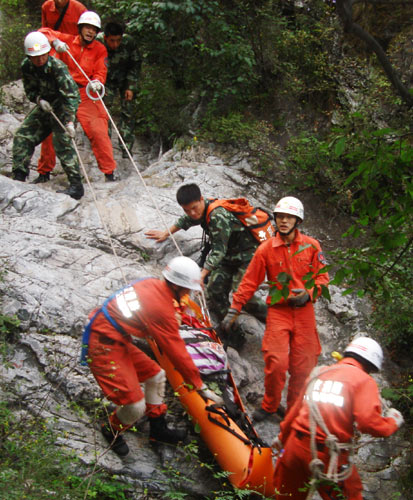Helping hand goes out to stranded
Updated: 2011-11-26 10:18
By Xu Wei (China Daily)
|
|||||||||
 |
|
Firefighters with the Beijing Fire and Rescue Service's Huairou district detachment rescue an injured person near a mountain road close to Jiankou, on Sept 18, 2011. [Provided to China Daily] |
BEIJING - Standing on a hilltop overlooking breathtaking scenery, the Great Wall at Jiankou is one of the capital's most popular tourist destinations. It is also one of the most dangerous.
Every year, dozens of hikers are stranded near this unrestored relic after encountering difficult terrain or bad weather.
"It keeps us busy," said Geng Deke, a firefighter with the Beijing Fire and Rescue Service's Huairou district detachment. "About 66 percent of all our rescue missions occur at Jiankou."
So far this year, firefighters in the city's northern outskirts have helped 52 tourists who had run into trouble there - already more than the 35 people who needed assistance in 2010.
The walkway, which is in a "wild" section of the Great Wall, is extremely uneven and has walls that snake along a sheer cliff face. Emergency workers know better than anyone the risks that are entailed by an expedition to this beautiful but possibly deadly landmark.
Li Yong, the leader of Huairou's six-man mountain rescue team with the detachment, has taken part in many of the rescue operations that have been organized in the district since 2006.
"I'm often stunned by the lack of precautions taken by the travelers who visit Jiankou," said the 23-year-old. "Women sometimes wear sandals and some people have nothing more than a bottle of water."
Growing up in the mountainous province of Yunnan among the Yi ethnic group, Li spent much of his youth scaling peaks to hunt animals and gather wood. He joined the emergency services in 2005 and is now considered to be the best climber in his department.
Li said that the most important task in a mountain rescue is to find the victims as quickly as possible.
"Many times we ask the people calling for help where they are, and they have no idea," Li said. "We can only collect what information they give us, and then we follow their path up into the mountains.
"We always shout out and then listen for the stranded people to respond.
"But sometimes it's hard to hear people, even if you're walking past them.
"Sometimes things that sound really close are actually on the other side of the mountain."
Finding a stranded party is one thing and getting them down is another - especially if they are injured.
Li recalled that, on several occasions, emergency crews could not get people down the mountain safely without taking them on stretchers across ravines and over slippery slopes.
"You have to try really hard to keep the victim's body steady, so you don't aggravate an injury," he said.
There are places near Jiankou that only highly skilled rescuers using alpine ropes and other special equipment can get to.
"When we're in that situation, operations can become very difficult," Li said.
To prevent accidents, every firefighter should learn about 30 ways to secure a rope, he said.
"There are lots of hidden dangers, too," he said. "Many rocks may look stable, but they can move when a certain amount of weight is placed on them.
"All we can do is fight as a team and help each other out. That's how we overcome the fear and physical exhaustion."
Qu Hui, a fellow team member, could not agree more. He has had more than his share of scary moments at Jiankou.
"Sometimes, life or death is decided in just seconds," said the 24-year-old. "There have been several times when I have almost fallen off a cliff before one of my colleagues has grabbed me by the arm and saved my life."










